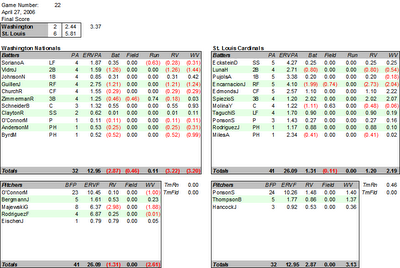ERV Boxscore for April 27, at St. Louis
 Pitching, Pitching, Pitching.
Pitching, Pitching, Pitching.I lied. Everything I wanted to say was said by Capitol Punishment.
-------
SNV here. I actually disagree with Capitol Punishment. Not about Bowden being a fool with an ego too big to admit he's wrong - no one can reasonably argue with that. But about pitching.
The problem with the Nats' pitching is that it is much too fragile. Way too fragile. Patterson is flaky at best, Armas is beyond injury prone, and the rest of the guys are simply below replacement level, and are predictably blown out when asked to actually give the team major league innings.
Oddly, the Nats have essentially the baseline of what you want from a pitcher for RFK and the NL East in Livan. He's extraordinarily durable and lets the opposition put the ball in play. For the most part, that is going to keep runs down in a low-ERA environment like the NL East. Patterson, to me, would be the best of all worlds if healthy - a high strikeout AND absurdly fly-ball oriented. So they do have a solid pitching foundation.
The Nats only need to scour the league for dependable, league-average arms. They usually can be had cheaply - they picked up Loaiza at a reasonable price last year, and there is no reason that they couldn't do it again. How about picking up a knuckleballer like Chuck Haeger from the White Sox organization? Flyballs are outs in RFK, so there isn't much risk in putting him out there, and his arm isn't going to get hurt. Eric Milton would work. Seriously (once he is back from knee surgery). And Cincy would undoubtedly pick up some of his salary. Casey Fossum would have to be another candidate, if you can get him away from Tampa Bay.
What they need is good defense (to create a high defensive effeciency) and on base percentage skills. So far, only two players meet that goal - Nick Johnson and Ryan Church, when he's not in centerfield. Everyone else needs to improve (I'm talking to you, Dutch) or be replaced (I'm talking to you, ClaytonGuzman).



4 Comments:
Hey I read what you said about Bill James' comments on bunting. I'm reading Moneyball right now, and i don't know if you have a copy, but there's a part in it where Michael Lewis is talking about how Bill James thinks that the error is the most irrelevant and absurd fielding statistic there is. I'm having a hard time understanding this passage, because it seems like Lewis contradicts himself in explaining why James believes this. He gives a brief history of where the error came from, then he makes it out to seem like it would be okay not to go for a ball if wasn't going to cost you an error. Like you should wait for the ball to come to you. Fundamentally, that doesn't make sense to me. Maybe I just don't understand the minutae of the error call. The past and present tense of the passage is kind of weird too and it's driving me NUTS. If you have a copy of the book it's on pp. 66-67, from about midpage to midpage. Personally I don't really give a damn about errors at all, but you seem to know what you're talking about and I'm hoping you can help me. I know I sound crazy but this is not bogus i promise.
race179@yahoo.com
I think James' point is that defensive range is much more important than errors. If you're middle infielder who is able to physically get to 50 more grounders a season than an average player and you end up with 5-10 more errors than an average player, then those 40-45 more outs are much more valuable than the cost of the errors.
Something like that. DM can probably say it better.
Great question, and your obsessiveness is of the kind we like here at Nats Blog.
I may devote a whole post to this, but Scott's got it right. The current Error rule essentially requires that the player get to the ball to make a play, but then misplay the ball. A really bad fielder, like me, never even gets to the ball, so it will be scored a hit, even though most MLB fielders would have made the play easily.
If you saw the game the other night where Soriano dropped a double hit to Left-Center (the first one), that was a good example. Even though the ball hit his glove, it took extraordinary effort to reach it, so it properly not called an error.
There is also the separate problem of inconsistency among scorers in granting errors. That alone greatly diminishes their signal-to-noise ratio.
James pointed out that you have to back up when looking at fielding stats, and start counting the plays the fielder made (PO,A and E), rather than the misplays (i.e. errors), because that is more objective, though still incomplete. Errors are based on too many assumptions that can be quite mistaken.
Perhaps Bill James's greatest contribution is simply forcing us to back up and question the assumptions on which our statistics and conclusions are based.
Mr. Nova,
That was precisely the point of my half-cocked, bitter, angry, overly emotional rant. There ARE things that Bowden could've done. He just hasn't done them.
All he does is bleat about pitching, pitching, pitching, but he doesn't give a rat's ass about it, choosing instead to shuffle A-ball pitchers up and down to the majors, and risk losing actual useful players in the process.
Post a Comment
<< Home